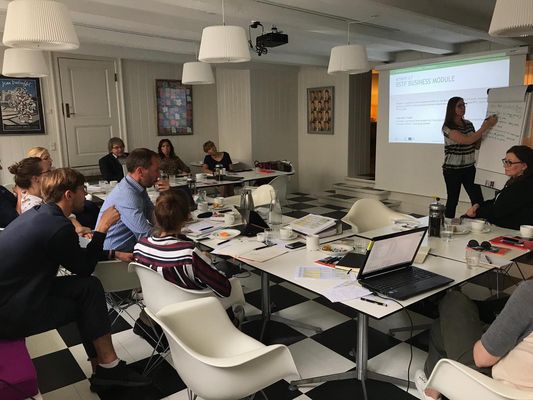On the 4th of June 2019 the BSTC partners hosted their 6th project meeting in Copenhagen, Denmark. During the one-day meeting the guests from associated and supporting partner organisations learned first-hand about the state of the project and the upcoming activities in the following 6 months. During the three years of project work, the five partners from Lithuania, Poland, Denmark and Germany, in close cooperation with the Policy Area Tourism, worked intensively on implementing a number of services that have been found of high importance for the Baltic Sea region and its tourism industry. In the following we want to give you an overview on what has happened so far and is to follow for the Baltic Sea Tourism Center.
1. Implementation of the BSTC - Operational and Strategic Approach
After consulting partner organisations and target groups in the past 2.5 years, the added value of the BSTC and its services for the Baltic Sea region and the tourism industry have been identified. One of the results of this process: the implementation of four Expert Groups, focusing on the topics Tourism Policies, Market Research, Sustainable Tourism and Training Offerings. All four Expert Groups shall further specify the already defined BSTC services such as lobbying the tourism sector in the Baltic Sea region on EU (and programme) level, publishing the annual BSTC Tourism Reports, extent Product Development Workshops for tourism stakeholders and implementing the Sustainable Tourism Award at the annual Baltic Sea Tourism Forum. Thus, the Expert Groups could become the operational fundament of the Baltic Sea Tourism Center.
Nevertheless, the BSTC team is confronted with the question on how to continue with its activities after the end of the project in December 2019. To keep the activities and deliverables of the project alive, the institutionalisation of the BSTC within the framework of an European Grouping for Territorial Cooperation (EGTC) could be a suitable strategic approach. With its own legal personality, the EGTC creates a network of public institutions and authorities, aiming at facilitating and promoting cross border cooperation by bringing together tasks from different governance levels. However, the EGTC cannot be set up independently by one organisation. The will and commitment of organisations and stakeholders involved is needed and crucial for securing the further work of the Baltic Sea cooperation under the roof of the BSTC. To foster the permanent cooperation and to build the foundation for the EGTC, the BSTC will now work on the implementation of a long-term agreement with potential partners.
2. BSTC Tourism Market Monitor® and BSTC Tourism Trend Radar®
At the now held BSTC Partner meeting in Copenhagen, the University of Applied Sciences Stralsund, initiator and developer of the BSTC Market Reports “State of the Tourism Industry in the Baltic Sea Region – 2018 Edition”, gave an outlook on the new reports that are currently being produced and that will be published later this year. The second BSTC Market Report, planned for September 2019, will give an overview on relevant data for the extended timeline 2014-2017. Additionally, the first BSTC Trend Report “Trends of the Tourism Industry in the Baltic Sea Region – 2019 Edition” will be finalized by the end of 2019. The trend report will give insights on the tourism developments and trends in the BSR and thus can become a helpful tool when further sculpturing and directing the tourism sector around the Baltic Sea.
The publications are permanent services of the BSTC and are part of the work of the BSTC Expert Group Market Research.
All published BSTC Reports are available for download on https://bstc.eu/downloads
Background: At the Baltic Sea Tourism Forum in 2018, the BSTC project was able to introduce the first BSTC Market Report “State of the Tourism Industry in the Baltic Sea Region – 2018 Edition”. This first report, generated for the BSR as a whole, did define the BSR geographically and provided facts and figures relevant for the tourism industry for the years 2014-2016. It also gave a detailed analysis of strengths and weaknesses of the Baltic Sea region as a tourism destination as well as a detailed overview on individual BSR countries with contributions of politicians and DMO’s.
3. Product Development Handbook and Product Promotion
After conducting several product development workshops in the BSTC partner regions (Klaipeda Region, Pomorskie Region, Copenhagen Countryside and Mecklenburg-Vorpommern), the BSTC is currently developing a handbook providing the used workshop methodologies. The paper allows trained workshop leaders to organise own product development workshops in the BSR and shall give regions and SMEs around the Baltic Sea the chance to be more creative when it comes to developing new services or vacation packages. The Product Development Handbook shall later be integrated in the work of the BSTC Expert Group Training Offerings.
Background: Last year, tourism service providers from the partner regions took part in a number of Workshops that supported their product and service optimization and development. The offers developed, targeted natural and cultural heritage sites in the BSR and focused on the topics active tourism, season extension and sustainability. The outcome can be found on www.balticsea.travel
To better promote the developed products and the BSR to potential visitors in the source markets Austria and the United Kingdom, the project team implemented a Smart Destination Campaign. So far, the essential parts of the campaign have been the execution oftwo street promotions and Tour Operator Summits in Vienna and London. The BSTC team plans to organize study trips for Journalists and Tour Operators to the partner regions as well as additional cooperation with media.



